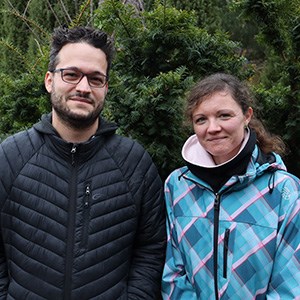Soil is a vital but finite resource that we need to manage sustainably in order for it to provide us and other species with ecosystem services such as food and carbon sequestration. Soils with a high quality are essential for achieving climate neutrality. However, the status of soils worldwide is degrading, which calls for more knowledge on sustainable soil management to develop suitable measures.
SLU is at the forefront of research on sustainable soil management, and the expertise has now grown even larger. Tino Colombi and Katharina Meurer have recently had the honour to become associate professors, meaning that they are now independent researchers. Their work has high relevance for how soil can be part of the solution to current issues related to climate change and food production.
Models for carbon storage
Katharina Meurer’s research focuses on uncovering the dynamics of soil organic carbon storage. Specifically, she studies the relationship between soil structure and carbon storage. It is a current hot topic for policymakers trying to find ways to mitigate climate change, and relevant for farmers aiming to improve their soil management.
- Carbon sequestration in agricultural soils has received a lot of attention regarding its potential to offset parts of our carbon dioxide emissions. The questions of “how” and “where” to store carbon in the soil are still not completely answered. However, the processes that are involved in carbon storage in soils are very complex and needs more research. We develop mathematical models to understand what is happening in the soil and in order to make predictions for the future.
Contributing to the development of new cropping systems
Tino Colombi focuses on plant-soil-management interactions in arable systems and their implications for plant physiology and soil functioning. He deploys experimental and theoretical approaches to identify mechanisms at the root soil interface that underpin plant growth and crop productivity. In the long term, such insights may contribute to the development of novel cropping system that ensure the long-term productivity and sustainability of global crop production.
- My research goal is to uncover root traits that can improve the resistance and resilience of agroecosystems to global change phenomena such as drought and soil compaction. To achieve this, I investigate how biophysical processes at the root-soil interface interact with root growth, water and nutrient acquisition, and carbon allocation in soil-plant systems.
Visions for the future
Both Tino Colombi and Katharina Meurer are looking forward to continue developing their research, and as such contributing to find solutions to pressing sustainability challenges in agriculture.
On the question of his visions for the future, Tino Colombi says that he hopes to continue working in an interdisciplinary and international context.
-Collaborations across scientific fields and a vivid exchange with relevant stakeholders such as plant breeders, agricultural advisors, and farmers are cornerstones of my current research. I believe that bridging scientific disciplines will be key to achieve a holistic understanding on the functioning of arable soils and ultimately to find ways to use this resource in a sustainable way.
Katharina Meurer hopes for broader implementation of research models that can predict how soil organic carbon will behave in the future with regard to a variety of factors.
-The models we develop together with outstanding researchers here at SLU should be used on a higher level beyond the Swedish borders, but also in terms of inclusion into national climate reporting and decision-making. Within the EJP SOIL programme, which SLU is involved in with 23 other European countries, we will use these models for different European countries. It feels like a first step in the right direction.
